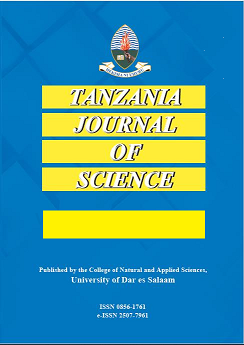The Role of Agricultural Social Enterprise to Smallholder Farmers’ Adaptive Capacity to Climatic Stresses in Tanzania
DOI:
https://doi.org/10.4314/tjs.v48i1.10Keywords:
Climatic stresses, Adaptive capacity, Social enterprises, Social entrepreneurshipAbstract
This paper intended to ascertain the implications of agricultural social enterprise on the adaptive capacity of smallholder farmers to climatic stresses in the Kilolo District, Tanzania. The study used a sample of 90 households. Household questionnaires, focus group discussions (FGD), and key informant interviews were used to collect primary data for this study. Secondary data were collected through a review of literature relevant to this study. The content analysis was used to analyse qualitative data, whereas quantitative data were subjected to Statistical Product and Service Solution (SPSS) version 20 for analysis. Microsoft Excel 2007 was used to analyse rainfall and temperature data trends of the study area. Findings revealed that the agricultural social enterprise found in the study area (i.e. One Acre Fund-OAF) enhanced the adaptive capacity of smallholder farmers since the services it provided to its clients positively influenced the functioning of the determinants of adaptive capacity and consequently led to the increase of average maize production per acre by 54.5%. This study concludes that agricultural social enterprises such as OAF have the potential to enhance smallholder farmers’ adaptive capacity to climatic stresses, however other stakeholders should come together to support this cause.
Keywords Climatic stresses; Adaptive capacity; Social enterprises; Social entrepreneurship


